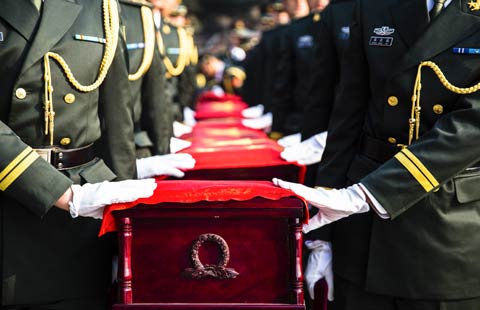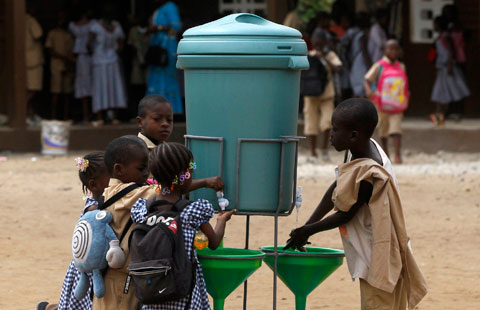Ebola watch list shrinks as US ratchets up response
Updated: 2014-10-20 17:20
(Xinhua)
|
||||||||
CDC TO REVISE GUIDELINES
The CDC is soon expected to update its guidelines for health care workers treating Ebola patients, officials said on Sunday, amid criticism that safety protocols for Ebola treatment are insufficient and inconsistent.
The new guidance, modeled after a World Health Organization guideline, will be more stringent and will set a firmer standard in protecting health care workers.
It will call for full-body suits and hoods that protect worker's necks, set rigorous rules for removal of equipment and disinfection of hands, and call for a "site manager" to supervise the putting on and taking off of equipment, an unidentified official told the Associated Press.
The CDC earlier said a "breach of protocol" led to the infections, but the agency and the Dallas hospital have so far failed to pinpoint the exact cause.
A nurse working at Texas Health Presbyterian hospital in Dallas told CNN that the hospital failed to provide adequate equipment to workers when they were treating Duncan. They said they were laying their neck bare in the protective suit and that the two infected nurses probably contracted the virus in that way.
PENTAGON JOINS IN
The US Department of Defense on Sunday announced its own Ebola plan. The military is creating a 30-member team which will be tasked with providing emergency assistance in case there might be more cases of Ebola virus infection in the country.
DOD spokesman John Kirby said in a statement that the step has been taken at the request by the country's Department of Health and Human Services, stressing the team will stand ready to "respond quickly, effectively, and safely" in the event of more Ebola cases.
The statement said that Defense Secretary Chuck Hagel has instructed the chief of US Northern Command to prepare and train "20 critical care nurses, five doctors trained in infectious disease and five trainers in infectious disease protocols."
After receiving up to one week of very specific instruction at Fort Sam Houston in Texas, the team will then be prepared to deploy if ever needed to cities across the country.
The team would not be sent to West Africa or other overseas location, and would "be called upon domestically only if deemed prudent by our public health professionals," Kirby said.
- China donates $6mln to assist Ebola-affected
- Liberia president describes heavy cost of Ebola
- Ebola facts: origin, spread and myths
- What they say - Frontline staff in the battle against Ebola
- China, France to join hands to combat Ebola
- China, US eye more cooperation on fighting Ebola
- South China city clears up Ebola rumors
- 2 suspected Ebola cases in Spain test negative
- Xinjiang publishes anti-terror brochures
- Security pact sealed with Afghanistan
- President Xi encourages international cultural exchanges
- Premier Li: China willing to help Afghan infrastructure
- Chinese FM: China, Asia-Pacific become community of shared destiny
- Foreign minister remarks on possibility of China-Japan summit
Most Viewed
Editor's Picks

|

|

|

|

|

|
Today's Top News
VW defends safety of recalled New Sagitar
Former premier makes Hurun philanthropists list
Xinjiang publishes anti-terror brochures
SOHO endows $10m to Yale
Cook and Ma talk about partnership
Language a barrier to healthcare for Asian Americans
China businesses need innovation: VC
Security pact sealed with Afghanistan
US Weekly

|

|















